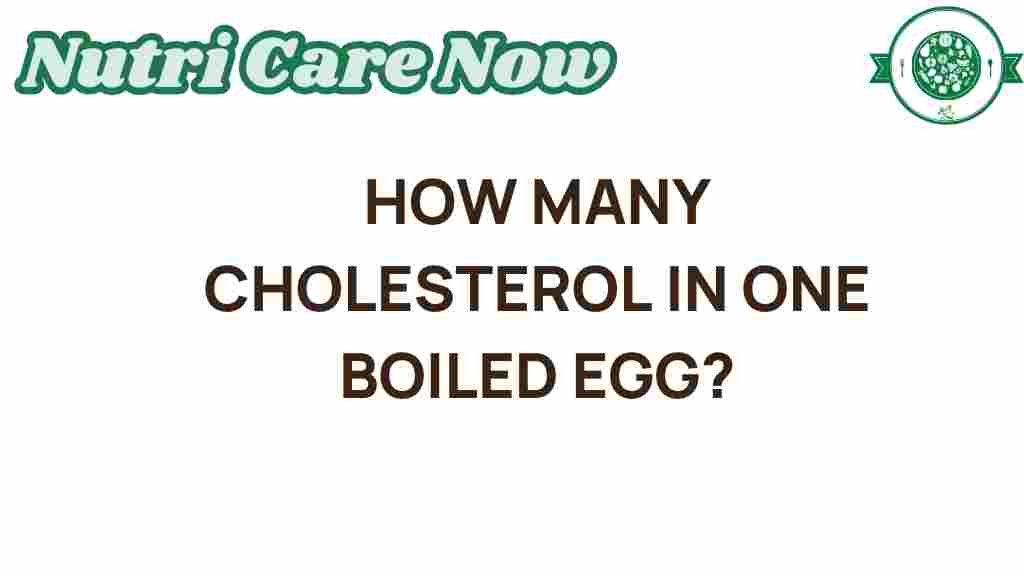The Surprising Truth About Cholesterol in a Single Boiled Egg
Cholesterol has been a hot topic in nutrition and health discussions for decades. Many people are concerned about the cholesterol content in their diets and how it affects their heart health. One common food that comes under scrutiny is the boiled egg. In this article, we will explore the relationship between cholesterol, boiled eggs, and overall nutrition, alongside important dietary fats, proteins, and their impact on heart health.
Understanding Cholesterol and Its Types
Before diving into the specifics of boiled eggs, it’s essential to understand what cholesterol is. Cholesterol is a waxy substance found in every cell of the body and is necessary for producing hormones, vitamin D, and substances that help digest foods. It travels through the bloodstream in two primary forms:
- Low-Density Lipoprotein (LDL): Often referred to as “bad” cholesterol, high levels of LDL can lead to plaque buildup in arteries, increasing the risk of heart disease.
- High-Density Lipoprotein (HDL): Known as “good” cholesterol, HDL helps carry cholesterol away from the arteries and back to the liver, where it is processed and removed from the body.
The Nutritional Profile of a Boiled Egg
A single boiled egg provides a wealth of nutrients, making it a valuable part of a balanced diet. Here is a breakdown of what a boiled egg contains:
- Calories: Approximately 68 calories
- Protein: About 6 grams
- Fat: Roughly 5 grams, including saturated fat
- Cholesterol: Approximately 186 mg
- Vitamins: B12, D, A, B2, B5
- Minerals: Selenium, phosphorus, and iron
With this impressive nutritional profile, boiled eggs are an excellent source of protein and essential vitamins and minerals that contribute to overall health.
Cholesterol in Boiled Eggs: What You Need to Know
One boiled egg contains about 186 mg of cholesterol, which is a significant amount considering that dietary guidelines suggest limiting cholesterol intake to 300 mg per day. However, recent research has shifted the focus from dietary cholesterol to the types of fats consumed and their overall impact on heart health.
Studies indicate that for most people, consuming foods high in cholesterol, such as eggs, does not significantly affect blood cholesterol levels. Instead, the types of fats in your diet—particularly saturated fat—play a more significant role in influencing cholesterol levels in the bloodstream.
Heart Health: The Role of Dietary Fat
When it comes to heart health, it’s crucial to distinguish between different types of dietary fat:
- Unsaturated Fats: Found in foods like avocados, nuts, and olive oil, these fats can improve blood cholesterol levels and reduce the risk of heart disease.
- Saturated Fats: Typically found in animal products and some plant oils (like coconut oil), excessive intake can raise LDL cholesterol levels.
- Trans Fats: Artificially created fats found in some processed foods, which are harmful and should be avoided.
Boiled eggs, while containing some saturated fat, are primarily composed of healthy fats and high-quality protein, making them a heart-healthy option when consumed in moderation.
The Benefits of Including Boiled Eggs in Your Diet
Incorporating boiled eggs into your diet can provide several health benefits:
- High-Quality Protein: Eggs are a complete protein source, meaning they contain all nine essential amino acids needed for muscle repair and growth.
- Weight Management: The protein content in eggs can promote satiety, helping to control hunger and support weight loss efforts.
- Nutrient Density: Boiled eggs are packed with vitamins and minerals, contributing to overall nutrition without excessive calories.
- Choline Source: Eggs are one of the best sources of choline, a nutrient vital for brain health and metabolism.
How to Incorporate Boiled Eggs into Your Diet
Here are some simple ways to enjoy boiled eggs as part of a balanced diet:
- Breakfast Boost: Add boiled eggs to your morning routine. They can be eaten plain, or sliced on toast with avocado for a nutritious breakfast.
- Salads: Chop boiled eggs and add them to salads for extra protein and flavor.
- Snacks: Keep boiled eggs in the fridge for a quick, healthy snack option.
- Egg Salad: Make a healthy egg salad using Greek yogurt instead of mayonnaise.
Debunking Myths About Cholesterol and Eggs
Despite the presence of cholesterol in eggs, several myths persist regarding their health implications:
- Myth 1: Eating eggs raises cholesterol levels for everyone. Fact: Most people can consume eggs without significant effects on their blood cholesterol.
- Myth 2: Eggs are unhealthy due to their cholesterol content. Fact: Eggs provide essential nutrients that benefit health.
- Myth 3: You should only eat egg whites to avoid cholesterol. Fact: Whole eggs contain important nutrients found in the yolk.
Potential Risks and Considerations
While boiled eggs offer many health benefits, it’s essential to consider individual dietary needs:
- People with certain health conditions, such as diabetes or familial hypercholesterolemia, should consult with a healthcare professional about egg consumption.
- Balance egg intake with other sources of protein and healthy fats to ensure a well-rounded diet.
Conclusion: Eggs in Moderation for Optimal Health
In conclusion, the surprising truth about cholesterol in a single boiled egg is that they can be a part of a healthy diet when consumed in moderation. They provide high-quality protein, essential vitamins, and minerals that support overall health and well-being. Understanding the role of dietary fats and focusing on overall nutrition rather than just cholesterol counts can help you make better dietary choices.
So, enjoy boiled eggs as a versatile and nutritious food source while being mindful of your overall dietary patterns. If you’re looking to explore more about nutrition and heart health, check out this comprehensive guide on dietary fats for further insights.
Remember, as with any food, moderation is key. Incorporate boiled eggs into a balanced diet, and you can reap the benefits of this nutrient-rich food without compromising your heart health.
This article is in the category Health and created by NutriCareNow Team

1 thought on “The Surprising Truth About Cholesterol in a Single Boiled Egg”